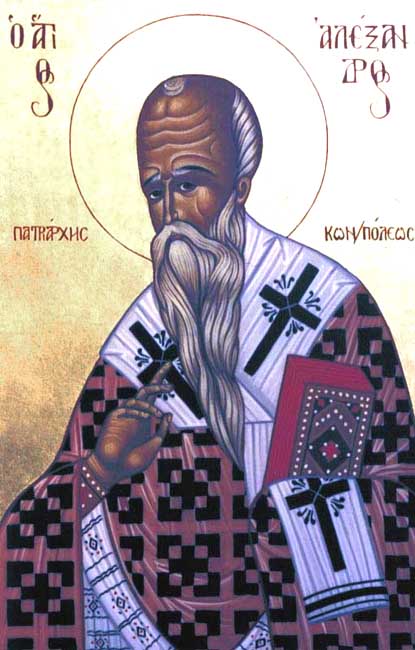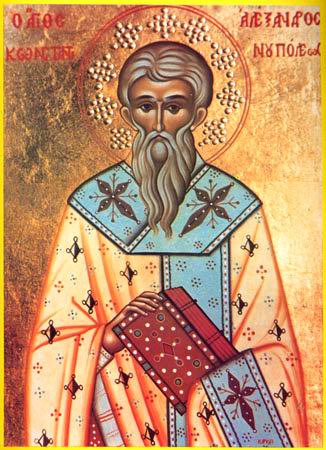|
Συναξαριστής |
30 Αυγούστου όνομα: ΑΛΕΞΑΝΔΡΟΣ (Αλέξανδρος, Αλέξαντρος, Αλέκος, Αλέξης) |
 |
Ο ΑΓΙΟΣ ΑΛΕΞΑΝΔΡΟΣ Πατριάρχης Κωνσταντινούπολης άλλη μια εικόνα γα τον Αγιο Αλέξανδρο Στην Α' Οικουμενική σύνοδο, πού έγινε στη Νίκαια της Βιθυνίας, ο τότε Πατριάρχης τον εξέλεξε αντιπρόσωπο του. Και όταν στη Σύνοδο αυτή καταδικάστηκε ο Αρειος, ο Αλέξανδρος, αν και γέροντας 70 χρονών, δέχθηκε να περιοδεύσει στη Θράκη, Μακεδονία, Θεσσαλία και στην υπόλοιπη Ελλάδα, για να διδάξει και να γνωστοποιήσει τα ορθά δόγματα των αποφάσεων της Συνόδου της Νικαίας. Αλλά ενώ βρισκόταν στην περιοδεία αυτή, ο πατριάρχης Μητροφάνης απεβίωσε. Όρισε όμως διάδοχο του τον Αλέξανδρο, διότι, παρά το γήρας του, είχε τα κατάλληλα εφόδια για τη διακυβέρνηση της αρχιεπισκοπής της πρωτεύουσας. Πράγματι, σαν Πατριάρχης ο 'Αλέξανδρος ανταποκρίθηκε σωστά στις δύσκολες περιστάσεις των καιρών. Τότε ο Αρειος είχε εξαπατήσει το βασιλιά Κωνσταντίνο ότι δήθεν πιστεύει ορθά. Και ο βασιλιάς διέταξε τον 'Αλέξανδρο να αφήσει τον Αρειο να μετέχει της Θείας Κοινωνίας. ο 'Αλέξανδρος, λυπημένος, προσευχήθηκε στο Θεό και ζήτησε τη βοήθεια Του. Η δέηση του Ιεράρχη εισακούσθηκε. Και το πρωί πού ο Αρειος με πομπή θα πήγαινε στην εκκλησία, βρέθηκε το σώμα του σχισμένο και σκωληκόβρωτο! ο Αγιος Αλέξανδρος απεβίωσε ειρηνικά το 340 μ.Χ. Saints Alexander, John and Paul  one more icon for Saint Alexander Saint Alexander (325-340) was a "chor-bishop" (vicar bishop) during the period of the first patriarch of Constantinople, Sainted Mitrophanes (315-325), and because of the patriarch's extreme age substituted for him at the First OEcumenical Council at Nicea against the Arians (325). Upon his death, Saint Mitrophanes had instructed in his will to elect his vicar to the Constantinople throne. During these times His Holiness Patriarch Alexander had to contend with the Arians and with pagans. Once in a dispute with a pagan philosopher the saint said to him: "In the Name of our Lord Jesus Christ I command thee to be quiet!", and the pagan suddenly became voiceless. When he gestured with signs of acknowledgement of his errors and affirmation of the correctness of the Christian teaching, then his speech returned to him and he believed in Christ together with many other pagan-philosophers. The heretic Arius was punished through the prayer of Saint Alexander. The heretic deceitfully agreed to enter into communion with the Orthodox, and the emperor Saint Constantine set a day for receiving Arius. All night long Saint Alexander prayed, imploring the Lord not to permit the heretic to be received into communion with the Church. In the morning, when Arius triumphantly went to the church, surrounded by imperial counselors and soldiers, he was stricken with illness on the Constantine Square, – his belly exploded and the innards fell out. His Holiness Patriarch Alexander, having toiled much, died in the year 340 at the age of 98. Sainted Gregory the Theologian (or Nazianzen, Comm. 25 January) made mention about him afterwards in words of praise to the people of Constantinople. Sainted John the Faster (582-595) is in particular remembered by the Church on 2 September (the account about him is located under this heading). Sainted Paul, by birth a Cypriot, became Patriarch of Constantinople (780-784) during the reign of the Iconoclast-emperor Leo IV the Khazar (775-780), and was a virtuous and pious but timid man. Viewing the martyrdom, which the Orthodox endured for holy icons, the saint concealed his Orthodoxy and associated with the iconoclasts. After the death of the emperor Leo, he wanted to restore icon-veneration but was not able to accomplish since, since the iconoclasts were still quite powerful. The saint realised, that it was not in his powers to guide the flock, and so he left the patriarchal throne and went secretly to the monastery of Saint Florus, where he took the schema. He repented his silence and association with the iconoclasts and talked of the necessity for convening the Eighth OEcumenical Council to condemn the Iconoclast heresy. Upon his advice, there was chosen to the patriarchal throne Saint Tarasios (784-806), at that time a prominent imperial counselor. The saint died a schema-monk in the year 804. |
| τέλος παράθεσης |
Οροι Χρήσης του κόμβου μας
|
Προστασία Προσωπικών Δεδομένων
|
 το γκρουπ μας στο FB
το γκρουπ μας στο FB
Copyright © www.eortologio.gr All Rights Reserved.
Copyright © www.eortologio.gr All Rights Reserved.
λέξεις για αποδελτίωση: εορτολόγιο, εορτολογιο, ΕΟΡΤΟΛΟΓΙΟ, γιορτη, γιορτή, ΓΙΟΡΤΗ, εορτή, εορτη, ΕΟΡΤΗ, συναξαριστής, συναξαριστης, συναξάρι, συναξαρι, γιορτάζει, γιορταζει, γιορτεσ, γιορτέσ, ποιός γιορτάζει, πότε γιορτάζει, ποιος γιορταζει, ποτε γιορταζει, υπολογισμός, κινητές, γιορτές, κινητες, γιορτες, κινητή, γιορτή, κινητη, γιορτη, κινητών, γιορτών, κινητων, γιορτων, ονομαστική, ονομαστικές, ονομαστικη, ονομαστικες, ονομαστικών, ονομαστικων, Πάσχα, Πασχα, αργίες, αργιες, orthodox, greek namedays, name day, pote giortazo, pote giortazei